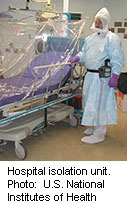November 13, 2014

 By Dennis ThompsonHealthDay Reporter
By Dennis ThompsonHealthDay Reporter
Latest Infectious Disease News
WEDNESDAY, Nov. 12, 2014 (HealthDay News) — Doctors in the United States have a near-perfect record of treating Ebola patients, with only one out of nine patients losing their lives while under hospital care in this country.
And the last person under treatment for Ebola in the United States, New York physician Dr. Craig Spencer, was released from Bellevue Hospital in Manhattan Tuesday after being declared free of the virus.
Which begs the question — is Ebola really as deadly and terrible a virus as many media reports have suggested?
In one sense, it is. Ebola is a virus that ravages the body, attacking all the major organs and causing terrible bleeding, vomiting and diarrhea. It can kill a person in any number of ways.
“I wouldn’t say the virus is any less lethal,” said Dr. Thomas Ksiazek, director of high containment laboratory operations for the Galveston National Laboratory at the University of Texas Medical Branch. “I wouldn’t want it, would you?”
But American doctors’ success at treating Ebola victims has revealed that the virus can be regularly bested, through a combination of early detection and solid supportive care.
Until now, the Ebola virus has been a devastatingly effective killer because it has spread in developing countries — primarily in Africa — with underfunded and often ramshackle medical systems, said Dr. Amesh Adalja, clinical assistant professor of emergency and critical care medicine at the University of Pittsburgh Medical Center.
In the current West African epidemic, Ebola has killed nearly 5,000 people and infected more than 13,200 individuals, according to the U.S. Centers for Disease Control and Prevention. Past outbreaks in East Africa have had death rates as high as 90 percent.
“We’ve seen Ebola face-to-face with medicine in austere settings,” said Adalja, who’s also a spokesman for the Infectious Diseases Society of America. “Now we’re seeing Ebola face-to-face with medicine in modern settings. It may not be as formidable here as it was there.”
Medical care for Ebola patients must focus on maintaining a patient’s fluid levels and responding to any organ failures that may occur, said Dr. Lee Norman, chief medical officer of the University of Kansas Hospital.
For the most part, that means providing IV fluids, giving blood transfusions as needed, and correcting any electrolyte imbalances that occur due to vomiting or diarrhea.
“Those three things are very pivotal in a person not going farther and farther into the disease, with no way to reverse it,” Norman said. Doctors also have to be prepared to put people on dialysis or mechanical breathing if the Ebola virus attacks the kidneys or lungs and causes those organs to fail.
U.S. doctors and nurses have been able to supply this necessary care. But, a lack of resources and trained medical personnel make it nearly impossible to provide the same level of care in Africa, Adalja said.
“They’re hearing reports of five liters of diarrhea a day. That’s going to be very challenging to treat, especially if you don’t have access to IV fluids, which many people don’t in West Africa,” he said. “It really speaks to the fact that good supportive care may make the difference between life and death.”
Ksiazek agreed that health professionals fighting the epidemic in West Africa are dealing with supply problems that don’t exist in America.
“I’ve seen and been around facilities there where there are fewer people taking care of 80 or 100 patients than the staff taking care of one of our patients here,” he said. “That might have some influence on the type of care you get, don’t you think?”
Ksiazek added that all American patients also have received one or more experimental treatments for Ebola — cutting-edge drugs and blood transfusions from survivors.
America’s success “is probably a combination of early supportive care and the potential for at least some of these drugs to have had a positive effect,” he said. “There’s almost none of that occurring in West Africa.”
Adalja compares Ebola to cholera, another disease that causes many deaths in developing countries.
“In the United States, you never hear of people dying of cholera, a disease in which the mainstay of treatment is just giving people fluids,” he said. “Any disease is going to be more challenging if you don’t have the resources to treat it.”
At a Tuesday morning news conference when he was released from Bellevue Hospital, Spencer urged Americans to turn their focus to West Africa — particularly the countries of Guinea, Liberia and Sierra Leone, the epicenter of the worst Ebola outbreak in history.
Spencer said that volunteer health staffers working there are crucial to turning the tide against the current outbreak.
“They are the true heroes that we are not talking about,” he said. “Please join me in turning our attention back to West Africa and ensuring that medical volunteers and other aid workers do not face stigma and threats upon their return home. Volunteers need to be supported to help fight this outbreak at its source.”
 Copyright © 2014 HealthDay. All rights reserved.
Copyright © 2014 HealthDay. All rights reserved.
SOURCES: Thomas Ksiazek, D.V.M., Ph.D., director, high containment laboratory operations, Galveston National Laboratory, University of Texas Medical Branch; Amesh Adalja, M.D., F.A.C.P., clinical assistant professor, emergency and critical care medicine, University of Pittsburgh Medical Center, and spokesman, Infectious Diseases Society of America; Lee Norman, M.D., chief medical officer, University of Kansas Hospital, Kansas City; Nov. 11, 2014, news conference at Bellevue Hospital, New York City, with Craig Spencer, M.D.
![]()